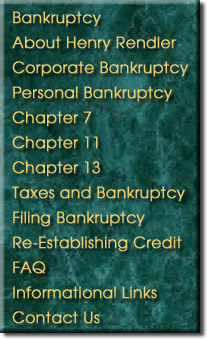
|
||||
| |
||||
|
|
||||
|
Personal bankruptcy is commenced by an individual filing Chapter
7, 11,
12 or 13.
The most common is Chapter 7. The debtor is allowed to exempt certain
property from liquidation by the trustee. The list of exempt
property includes homesteads, household furniture and furnishings,
jewelry, clothing, interests in an automobile, tools of the trade,
pensions, insurance policies, a "wild-card" or "grubstake"
exemption of $15,000.00, and other assets. Individual states are allowed
to "opt-out" of the federal exemptions and provide their
own lists. Exemptions can thus vary widely from state to state.
The "automatic stay" goes into effect immediately upon the filing. This stay prohibits any act to collect money or take property from the debtor. It stops wage garnishments, foreclosures, repossessions, and the like. The stay usually remains in effect throughout the case. Reasons for Denial of Discharge of Debts The individual debtor usually is discharged from legal liability for his debts, and receives a "fresh start". A discharge will be denied for improper activity, including:
Discharge of Debts Certain debts are not wiped out by the filing of bankruptcy, including:
Bankruptcy
is often a very effective tool for obtaining relief from oppressive
debt. The benefits of filing should be reviewed on a case-by-case
basis
Contacting Us If you would like more information concerning personal bankruptcy or other related legal matters in the State of California, Attorney Henry Rendler is available for consultation. Please feel free to call 408.293.5112 to set up an appointment.
|

| |||
|
| ||||
 with
a full review of all other options. Special attention should be
given to whether the debtor will receive a discharge, and the effects
of the discharge. Spouses of debtors often receive indirect relief
from a bankruptcy discharge, without having to file a petition.
Bankrupcy can be helpful in dealing with secured creditors, and
often allows a debtor to retain property and reduce his payments.
The co-debtor stay for consumer debts in Chapter 13 provides some
relief for a debtor's co-signers.
with
a full review of all other options. Special attention should be
given to whether the debtor will receive a discharge, and the effects
of the discharge. Spouses of debtors often receive indirect relief
from a bankruptcy discharge, without having to file a petition.
Bankrupcy can be helpful in dealing with secured creditors, and
often allows a debtor to retain property and reduce his payments.
The co-debtor stay for consumer debts in Chapter 13 provides some
relief for a debtor's co-signers.